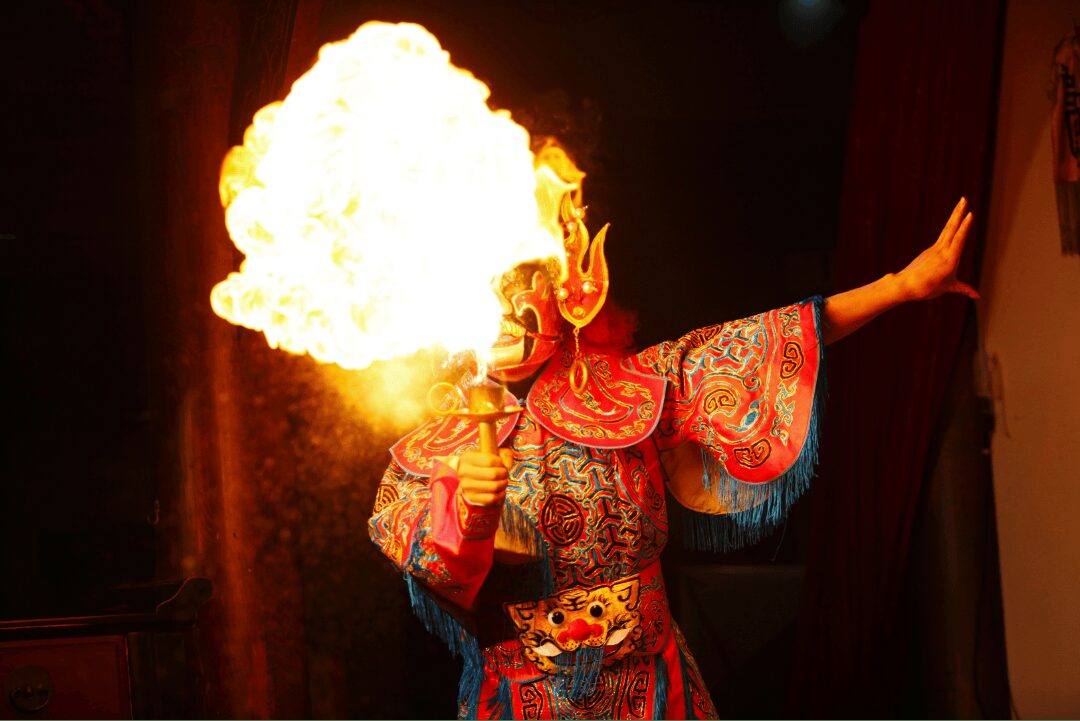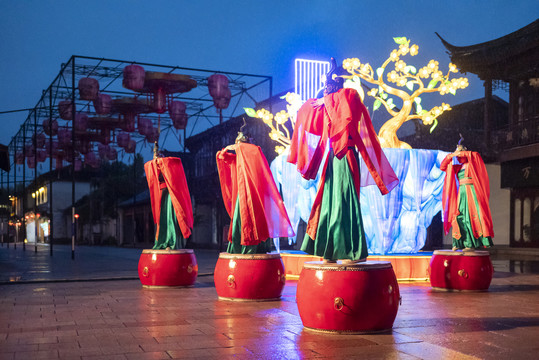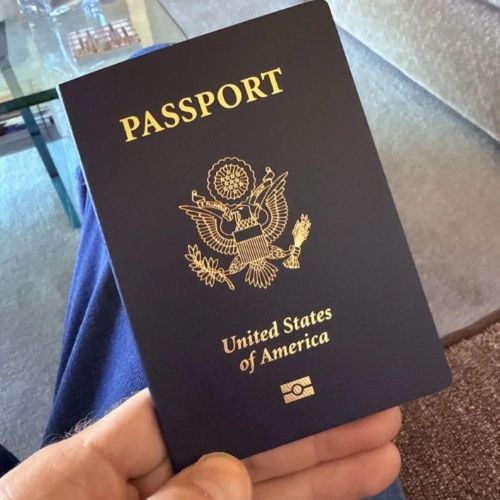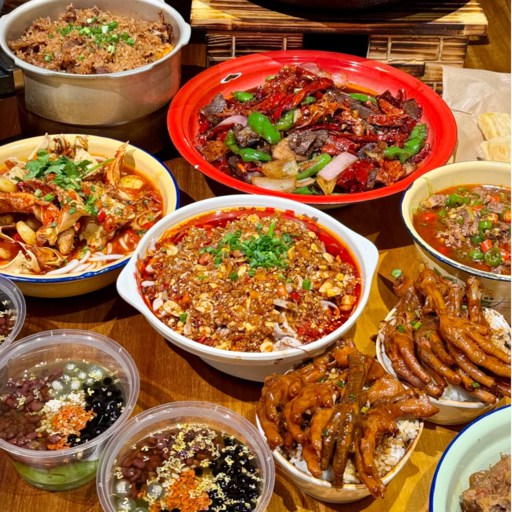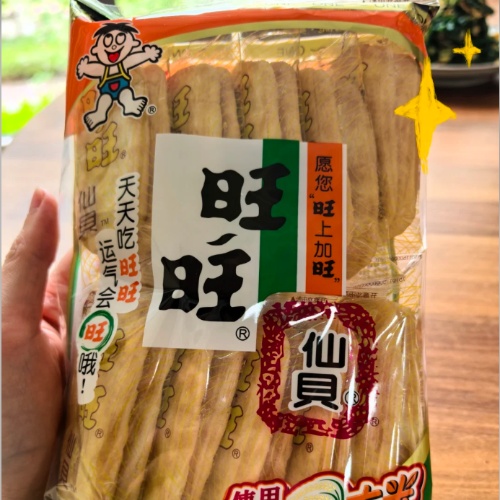Chinese nightlife isn’t either neon clubs or street food chaos—it’s both, side by side. One block has craft cocktails and techno basements. The next? Steaming dumplings and a noodle stall running on QR codes. It’s messy, loud, dazzling—and unlike anywhere else after dark.If you’re curious—like the kind of curious that makes you follow drumbeats down an alley or sip beer with strangers in a public square—then keep reading. Chinese nightlife is wild, warm, and weirder than you expect in the best way!
The Unique Atmosphere of Chinese Nightlife
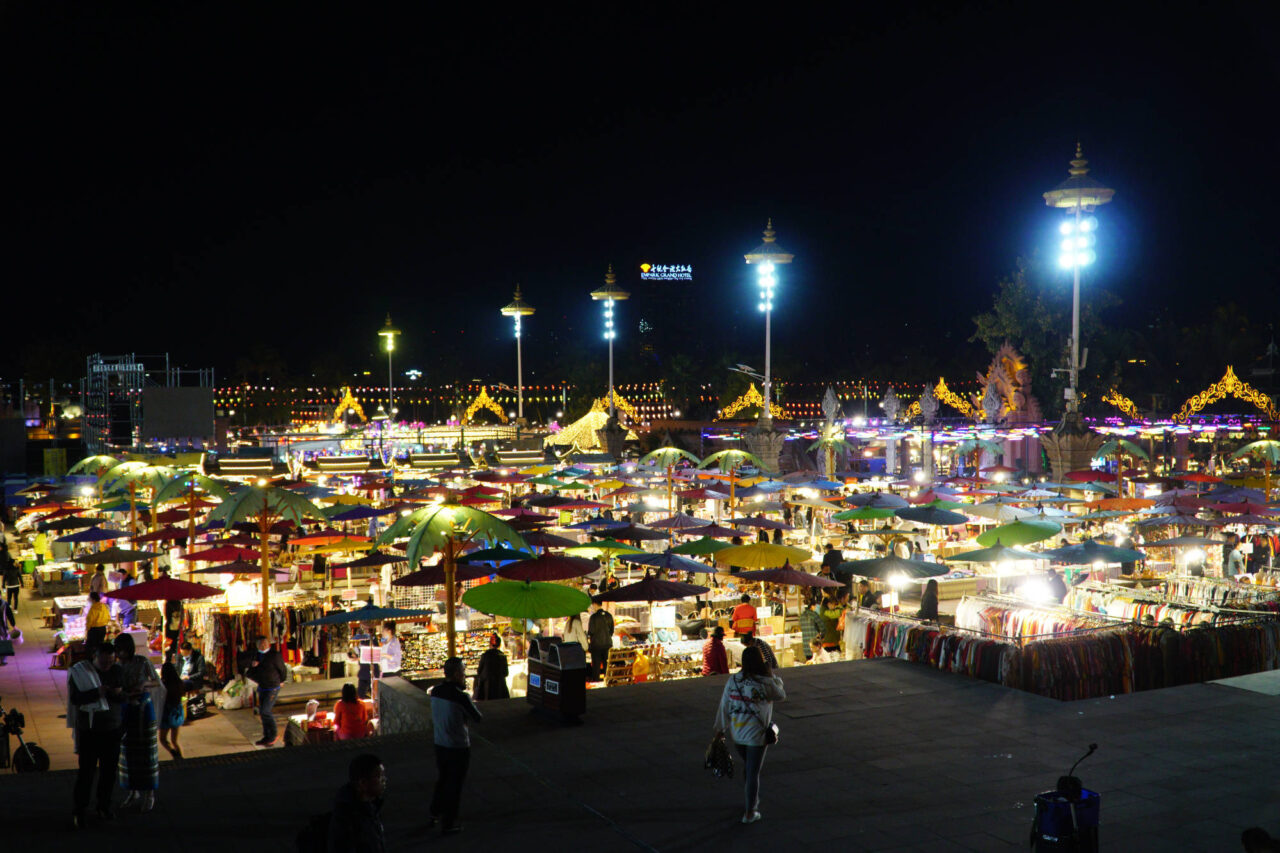
Crowded and vibrant Chinese night market
Culture, Lighting, and Crowd Dynamics Come Together After Dark
Chinese nightlife doesn’t hit you all at once—it creeps in. Around 7 p.m., when the streets still hum with leftover heat, vendors start setting up. Not rushing. Just slowly wheeling out carts, unfolding plastic tables. It’s not dramatic, but there’s this shift—you feel it in the air. Locals grab cold drinks from convenience stores, kids run around with glowing rabbit ears, and entire families claim sidewalk spots like they’re front-row seats to something only they know is coming.
What makes Chinese nightlife stand out is how collective it feels. In many Western cities, nightlife means private plans—reserved tables, ticketed shows, bouncers, exclusivity. But here? It’s public. Loud. Everyone’s in the mix. Dancing seniors in neon-lit parks. Mahjong tables by noodle stalls. Teenagers livestreaming their bubble tea orders under pink lanterns. The lighting, often over-the-top in the best way, feels more celebratory than functional. It’s not trying to be cool—it’s just trying to glow hard enough that no one feels alone in the dark.
And it works. You don’t need to “know where to go”—you just walk. That immersive light-and-people blend hits different. It’s not about chasing a vibe, it’s being surrounded by one. Chinese nightlife doesn’t offer a clean-cut, curated scene. But that’s why it feels real. It’s chaotic, sometimes too loud, occasionally confusing—but it’s also inviting, even if you don’t speak the language. That open rhythm is its charmSure, China has bars and clubs too—plenty of them. You’ll find rooftop spots in Shanghai, speakeasies in Chengdu, even techno basements in Wuhan.
How Chinese Night Markets Differ from Nightlife Abroad
If your idea of nightlife comes from Europe or North America, Chinese night markets will feel like stepping into a different planet—one that runs on streetlight haze, QR codes, and that unmistakable nighttime buzz. You’re not entering a bar with menus and background jazz. You’re diving into a wave of people yelling over skewers and plum juice. There’s no dress code. No reservations. And absolutely no waiting in silence.
Unlike overseas nightlife, where bars and restaurants operate as fixed points, Chinese night scenes move. That skewer guy might not be there tomorrow. The sugar artist setting up under a flickering light pole? He’s here tonight. That urgency gives everything a pulse. People don’t just go out to relax—they go to be part of something. It’s participatory. You argue over which dumpling stall is best, you get bumped by a kid chasing bubble guns, you queue behind ten others for a ¥18 grilled squid (about $2.50), and when it’s your turn, the vendor doesn’t even look up—he just nods, hands over the stick, and flips the next.
That raw energy is something a rooftop bar in Berlin or a Brooklyn wine lounge just doesn’t try to capture. Chinese nightlife is less about curated coolness and more about open warmth. It might look disorganized, but somehow it flows. That’s the thing: you’re not watching the night unfold—you’re tangled up in it. And maybe that’s why people keep walking, even when their bags are full and their feet hurt. They’re chasing the feeling, not the plan.
Best Places to Experience Traditional Night Markets
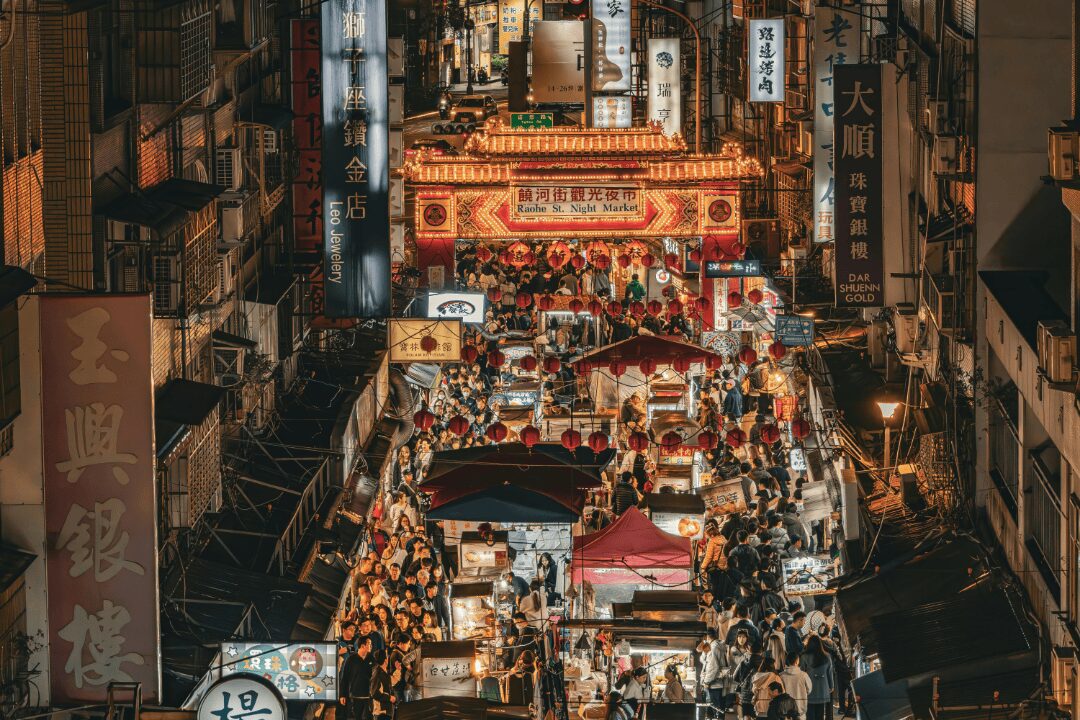
China’s Taipei Galaxy Night Market
Xi’an’s Muslim Quarter and Endless Food Options
Xi’an’s Muslim Quarter doesn’t ease you in—it grabs you. The scent of grilled lamb hits before you even see the stalls. Skewers sizzle on flat grills, steam rises from cumin-dusted noodles, and crowds push forward like they’ve all skipped dinner. There’s something about this place that feels ancient but alive, like it never needed to change. The old city wall towers nearby, but here, it’s the food that draws the line between past and present.
Every five steps, you want to stop. A girl in a hijab flips beef pancakes. A grandpa layers chili and vinegar onto cold noodles with surgical focus. You try biangbiang noodles once—chewy, thick, and intense—and suddenly nothing else matters. I watched two backpackers from Spain accidentally order five lamb skewers each. They shrugged, laughed, and somehow finished them all. It’s that kind of night street energy: loud, forgiving, and a little unpredictable.
What makes Chinese nightlife in Xi’an special isn’t just the food—it’s how the whole city seems to flow through this narrow street. Some corners are calm, lit by quiet lanterns. Others feel like a night market mosh pit. Prices stay low (¥10–30, or $1.40–$4.20) unless you try to buy the whole roast lamb. No one tells you where to go. You wander. You get jostled. And somewhere in the mix, you stop thinking like a tourist.
Taipei and Nanjing’s Nostalgic Street Life
Taipei’s Ningxia Night Market isn’t huge, but it doesn’t have to be. That’s kind of the point. There’s no rush. You walk under the lanterns like you’re heading to a neighbor’s block party. A woman deep-fries oyster cakes while singing along to a Jay Chou ballad. Somewhere behind you, a guy wins at ring toss and cheers like he just hit a jackpot. It’s sweet and casual and smells like garlic butter and peanuts.
Across the strait in Nanjing, things slow down even more. The Confucius Temple night market unfolds along the river. Lights ripple on the water, incense wafts from tiny altars, and street poets perform under archways. One night, I ate tanghulu for ¥10 while listening to a man quote lines from Dream of the Red Chamber. Was it a little strange? Yeah. But it felt like it belonged. Nanjing’s nightlife speaks to something quieter inside you.
Both cities are gentle on foreign visitors. In Taipei, you tap your EasyCard, smile, and eat. Nanjing’s tourist zone has plenty of signs in English, and hotel staff nearby are used to helping clueless newcomers find the good stuff. Neither place shouts for attention. They don’t need to. They invite you in softly—like a memory you didn’t know you had.
Lijiang and Zhangjiajie’s Tourist-Friendly Night Scenes
Lijiang’s Old Town feels curated, but not fake. Cobblestone alleys shine under red lanterns, and wooden buildings creak with soft music—sometimes a flute, sometimes a folk band, sometimes just someone humming. I found myself standing in front of a bar where two tourists were dancing to a Chinese remix of “Despacito.” No one batted an eye. That’s how loose it is here.
Prices are tourist-tier but fair. A beer might cost ¥60 ($8.30), and some tea houses charge for their river-view seats. If you're into shows, Zhangjiajie’s “Tianmen Fox Fairy” is a classic—¥280–¥380 ($39–$53) for a ticket. The lights, the costumes, the mountains as backdrop... it leans dramatic, sure, but it feels earned. You don’t need to understand every myth to get caught up in the magic.
Both towns make things easier for foreigners. Hotels near the old town almost always say upfront if they accept international guests (check Ctrip or Booking), and many staff speak enough English to point you the right way. Chinese nightlife here feels filtered through hospitality. It’s still lively, still full of flavor—but softened at the edges, like someone made it knowing you’d be visiting for the first time.
- Sichuan opera performance at night
- Chinese Hanfu performance at night
China’s Best Cities for Late-Night Fun
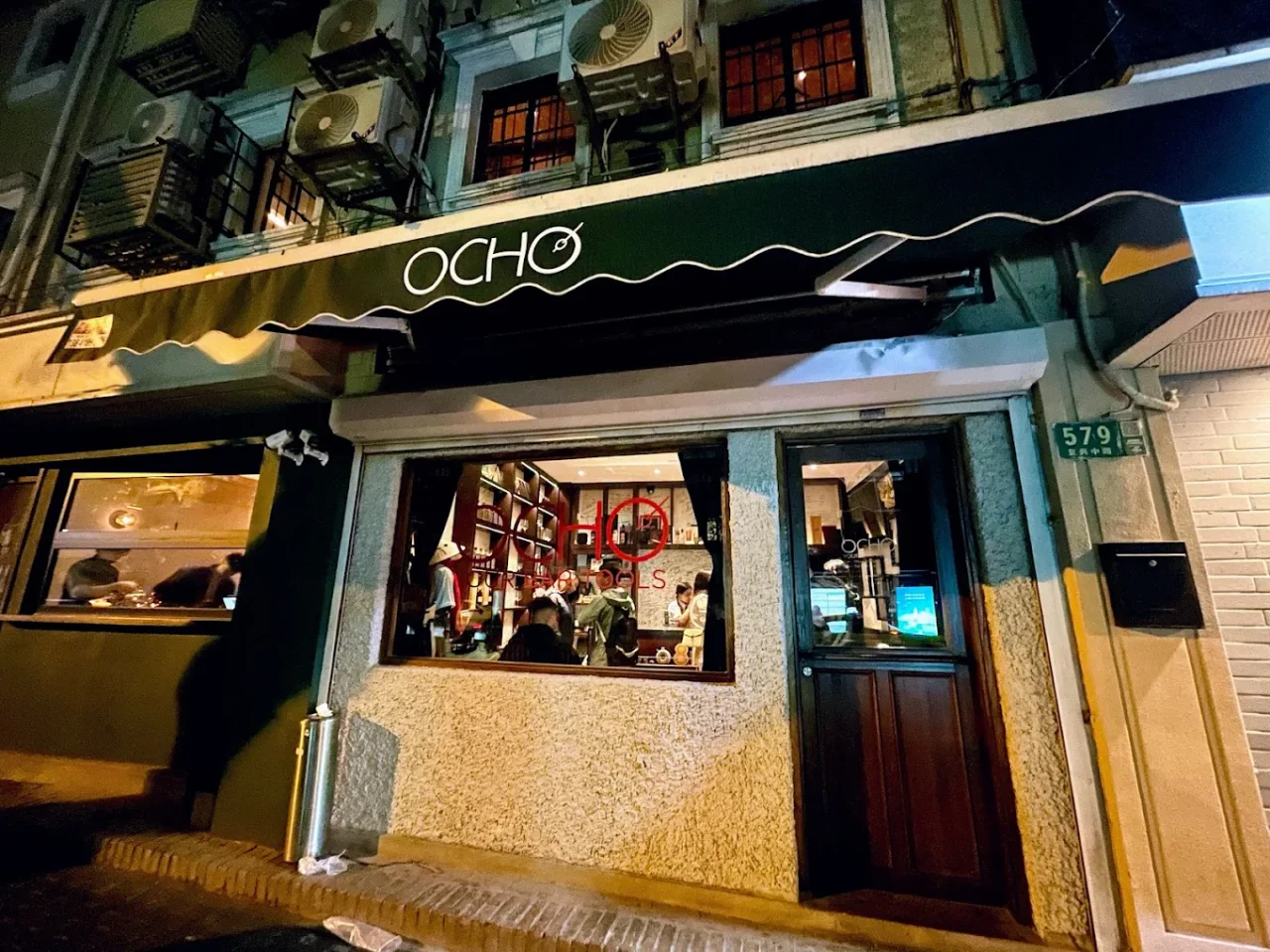
Hidden in the backstreets of Shanghai: Speak Low cocktail bar
Shanghai’s Rooftops and Hidden Speakeasies
You can walk down the Bund and see neon reflected on the river, but that’s not really where the night starts. For most people exploring Chinese nightlife in Shanghai, it begins somewhere above street level—maybe on a rooftop where the wind carries faint house music, or behind an unmarked door where the bartender doesn’t speak much, but the drinks say plenty. The speakeasy scene here isn’t just for aesthetics. Some spots, like Speak Low, are ranked globally—not for the decor, but because they know how to stir something you didn’t know you wanted.
Not everything’s glamorous though. You'll try to find the entrance to Senator Saloon and end up knocking on a cleaning closet. That’s part of the charm. These places aren’t screaming for attention; they’re waiting for you to be curious. Prices range from ¥60 to ¥180 ($8–25) per drink, and most don’t charge a cover, but some speakeasies might require a reservation—or someone to vouch for you. Bar Rouge? Definitely more public, and if you just want to dance in heels with the skyline behind you, it’s your spot.
And don’t worry if your Mandarin’s non-existent. These bars are used to expats, and yes—they accept foreign passports and most international cards if you’ve added them to Alipay. Still, it doesn’t hurt to screenshot key phrases just in case. Nothing breaks the mood like payment trouble when you’re half a cocktail in.
What else in Shanghai is worth your night?This guide’s got it all.
Chengdu’s Chill Vibes and Techno Basements
Now, if Shanghai is the flashy sibling, Chengdu is the one who’s too cool to care. Chinese nightlife here stretches late but leans slow. Locals are famous for their “mañana” attitude, and you’ll feel it in the rhythm of their bars. You’ll see people sipping craft beer at The Beer Nest while playing cards, or disappearing underground into .TAG, where techno blares in a fog machine haze that makes you forget what time it is.
And yet, everything feels relaxed. No one’s judging your outfit, your dancing, or your accent. Even when clubs ask for ID—yes, it happens—staff are often chill if you explain you’re a foreigner and show your passport. Some might even help you register on the spot. Entry fees hover around ¥80–150 ($11–21), depending on the event, but you rarely feel rushed. The vibe is more hangout than hustle.
Still, don’t expect polished menus and tourist-perfect translations. You’re a guest in someone else’s rhythm here. Be polite, be curious, and ask locals where to go next. In my case, someone once scribbled down three bar names on a napkin and said, “Follow the music.” I did. Worth it.
Changsha and Wuhan’s Rising Nightlife Scenes
These cities used to be considered second-tier, but let’s be honest—they’re not playing backup anymore. Chinese nightlife in Changsha and Wuhan is booming, and it’s not just locals noticing. DJs tour through now. Expats have started organizing regular meetups. You’ll hear trap remixes of Teresa Teng blaring from clubs that look like parking garages, and somehow it all makes sense.
In Changsha, head straight to Jiefang West Road. It’s where everything’s happening, from classic bottle-service clubs like MUSE to newer venues like 36 Line, which is surprisingly foreigner-friendly. Most venues offer booth packages from ¥800–2000 ($110–280) and entry fees from ¥50 ($7). Just know—on weekends or public holidays, things get packed. You’ll want to reserve in advance, or you’re standing outside while others sip champagne inside.
Wuhan leans more indie—Vox Livehouse hosts underground bands, and Boxing Cat Brewery gives you craft beer with a side of expat crowd energy. These places don’t feel “designed” for foreigners, but they welcome you anyway. And that makes a difference. You’ll feel less like a tourist, more like someone just joining the night.
Practical Tips for Finding Foreigner-Friendly Nightlife
The tricky part of Chinese nightlife isn’t that it’s hidden—it’s that it’s scattered. What’s hot changes weekly, and unless you’re already in the scene, it’s easy to end up at a bar that looks fun online but feels dead in person. So how do you avoid that?
Well, start with Google Maps—yes, it still works. Type in “bar [city name]” and check if the reviews are in English. Then cross-reference with TripAdvisor nightlife threads. You’ll notice patterns. If three people mention the same bartender in broken English, it’s probably a vibe.
Still want the local scoop? RED (Xiaohongshu) international version is picking up steam, especially for nightlife. Use phrases like “expat club [city]” or “外国人夜店” and translate the posts. They’re photo-heavy and often brutally honest. Or jump into Facebook groups like “Shanghai Expats” or “Chengdu Living”—someone’s always down to recommend a Thursday dive bar.
Just one thing: always check if they accept foreign cards or Alipay/WeChat with your international bank. Worst-case? Bring a few hundred RMB in cash, especially for night markets or street-side venues where QR code scanning may only work with local accounts.
Government Policies That Shape the Night Economy
You might not notice it at first—but behind that lively night market, those glowing boulevards, and the oddly well-organized chaos, there’s a lot of urban planning quietly at work. In China, “Chinese nightlife” isn’t just spontaneous—it’s being shaped block by block by city-level strategies. Cities like Chengdu and Shenzhen have carved out entire “light zones,” places designed specifically to feel safe, walkable, and, more recently, foreigner-friendly.
Chengdu’s Kuanzhai Alley, for example, offers food maps with English tips. In Guangzhou’s Beijing Road, volunteers walk around helping tourists at night. Shenzhen’s Longgang market? You'll hear bilingual emcees at weekend shows. It’s not perfect, but it feels like they’re trying.
But here’s the twist: some cities even appointed “Night Mayors”—not the ceremonial kind, but real coordinators tasked with keeping nightlife functional, inclusive, and less chaotic. In Beijing and Hangzhou, for example, they oversee how clubs deal with crowd control, how music venues manage volume near residential zones, and even how disputes get handled when drunk patrons (local or not) get into it. The idea is that nightlife should be sustainable, not just profitable.
Safety and Practical Tips for Enjoying Chinese Nightlife
Chinese nightlife feels open and energetic, but there are unspoken rules. Don’t film people in bars or clubs—privacy matters here, especially at private tables. Some booths are reserved or VIP-only, even if they look empty. I once saw someone gently reminded not to lean on a booth—it looked public, but wasn’t. Crowds can get thick, especially on weekends or near holidays, so keep an eye on your phone, wallet, and bag. It's generally safe, but packed places still call for basic street smarts.
For transport, Didi is your best bet after 11:30 p.m. when subways stop running. Use the English version of the app or WeChat’s ride-hailing mini program. But be prepared: some drivers might call to confirm pickup, and they usually speak only Chinese. Screenshot your destination in Chinese, or ask hotel staff to write it down for you. It saves a lot of stress.
Paying is the next hurdle. Yes, WeChat and Alipay support foreign bank cards now (VISA, MasterCard, JCB), but not every venue accepts them. Street vendors and some bars may still only take local QR codes. To avoid trouble, carry some cash—around 200–300 RMB is smart for a night out. If your card doesn’t work, stay polite. Most staff will offer a workaround like cash or pointing you to the nearest ATM.
Not sure how to pay like a local? Check out our guides on Alipay and WeChat code.
Frequently Asked Questions (FAQs)
Q: Do night markets even stay open in winter, or does everything shut down?
That depends—like, seriously depends. In big cities like Shanghai or Chengdu, most night markets just power through the seasons. You’ll still see vendors out there in January, bundled in coats, flipping skewers like it’s midsummer. But in smaller towns or high-altitude places like Lijiang? Yeah, some just vanish after October. I once tried to revisit a noodle stall in Zhangjiajie in December—ghost town. So unless a local swears it’s open year-round, maybe don’t build your whole night around it.
Q: Can I get legit vegetarian or halal food at these places, or is that pushing it?
A: You can—but let’s not pretend it’s easy. If you’re strict vegetarian or halal, it’s a bit of a scavenger hunt. Some vendors will say “no meat,” but then use pork oil. Or the wok they’re using just fried lamb skewers five minutes ago. In Xi’an, yeah, Muslim Quarter is great, but outside that? You gotta ask. I’ve seen a few tofu stalls in Chengdu that were safe bets, and in Nanjing, this old uncle near Confucius Temple swore his dumplings were all-veggie—though he also offered pork sauce “on the side,” which, hmm. So yeah, doable. Just not straightforward.
Q: Is there anywhere to sit down at these night markets, or am I eating on my feet all night?
Funny thing—I’ve had both. In Taipei, there are plastic stools everywhere. People just sit, eat, chat, like it’s a family dinner outside. But in places like Changsha or even parts of Shanghai, nope. You grab your skewers, dodge a kid with light-up shoes, and stand next to a trash can pretending it’s a table. One time I used a flower pot as a seat. Not proud. But hey, it worked. So yeah, bring your street-eating game, but also be open to tiny stools or no chairs at all. Somehow, that chaos kind of adds to the charm.
Q: Are you supposed to haggle at night markets, or is that rude?
Depends what you’re buying. Food? Nah. Arguing over a ¥12 grilled squid just feels wrong. But souvenirs, clothes, random toys with blinking lights? Totally. I once watched a guy get a ¥120 plush toy down to ¥40 by pretending to walk away three times. It’s kind of a game. Just keep it friendly—smile, joke, use calculator apps if you can’t speak Chinese. And if the vendor says no with a laugh? That’s usually your final price. Don’t push past that. Unless, of course, you really don’t want that panda keychain.
Q: Should I tip performers or vendors if I like what they do? Or is that weird?
You’ll probably feel the urge—I did too, especially when this kid in Nanjing played violin like he was in an orchestra. But tipping isn’t expected in China. Some performers might have a little bucket or QR code sign, and sure, if you’re moved, go for it. Just don’t make a big deal of it. Vendors? Nope, no tipping there. I once tried to hand extra cash to a lady selling tanghulu in Xi’an, and she looked confused, then gave me a free skewer instead. So yeah, it’s not offensive, but it’s not “a thing” either.
